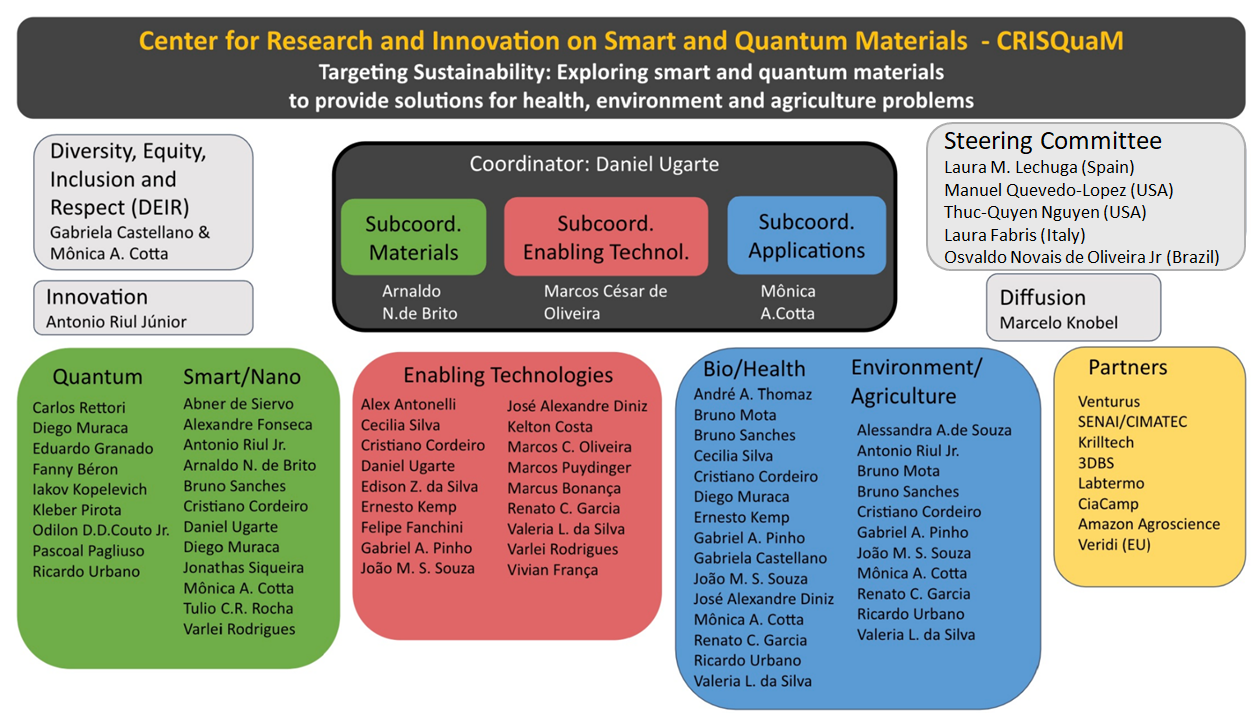BV-FAPESP: research projects supported in this Center
CRISQuaM in the Media: news about the center
CRISQuaM aims to explore the synergistic development of fundamental and applied science to create new materials with high potential for the construction of devices and sensors to address technological challenges related to sustainability, climate change, precision agriculture, ecology, and health. To achieve these goals, we have assembled an interdisciplinary and collaborative research team, integrating expertise across various scientific domains, researching novel materials with high innovation potential. By combining original synthesis methods, advanced characterization techniques, theoretical approaches, computational simulations, quantum technologies, and device construction designs, we aim to drive advances in smart and quantum materials, promoting scientific excellence and technological development. With this, we plan disruptive innovations in instrumentation—including hardware and AI-based tools—as well as in quantum technologies, biomedical devices, and signal processing, in addition to plant bionics, exploring plant-pathogen interactions. Besides research activities, we plan intensive actions in education, dissemination, and communication for the general public, as a modern society should be aware of the challenges humanity faces and how research and technology are essential for responsibly utilizing the planet's limited resources. CRISQuaM's Innovation activities are accelerated through partnerships with several companies in related technologies, many of them Brazilian. Finally, all activities of the Center are managed in accordance with diversity, equity, and inclusion goals and best practices.
The Center brings together scientists, engineers, and innovators in a collaborative effort to apply materials science and quantum technologies at the cutting edge, designing new materials and nano(bio)sensors for advanced diagnostics. The Center has a team capable of producing a wide range of (nano/micro) materials, along with precise chemical and physical characterizations using modern techniques (synchrotron, advanced microscopy, magnetotransport, magnetic resonance, optics, etc.). In addition, the team offers various options in enabling technologies, including miniaturization, processing, and additive manufacturing, as well as instrumentation, quantum sensing, and electronics development. Data analysis will employ updated approaches (numerical simulation, classical and quantum machine learning, and quantum optimization). Applications at the knowledge frontier will address urgent sustainability needs in environmental areas, precision agriculture, plant bionics, and biomedical interfaces, contributing to the development of local technologies in close partnership with the Brazilian industry.
The organization of the Center is based on three pillars — Materials, Enabling Technologies, and Applications — together with partner companies, as described in the figure below.

2024-09-10
A study conducted by Brazilian scientists and colleagues in other countries shows that earthquakes, hurricanes, tsunamis and volcanic eruptions increase the risk of extinction for mammals, birds, reptiles and amphibians. The natural events may have synergies with hazards due to human activity.
2024-09-10
Researchers affiliated with the FAPESP Research Program on Global Climate Change met at the State University of Campinas in Brazil to discuss current research priorities in the effort to understand and combat the consequences of the extreme events caused by global warming.
2024-09-09
Researchers at São Paulo State University (UNESP) in Brazil evaluated the effect of three different low-cost training programs on a group of socially vulnerable female volunteers. HIIT combined with muscle strength exercises was the most efficacious in terms of reducing blood pressure and arterial stiffness, the main risk factors for cardiovascular disease.
2024-09-04
In PLOS Pathogens, researchers at the University of São Paulo in Brazil report a study based on autopsies of 47 patients who died after being infected by the ancestral strain of SARS-CoV-2. The findings will support clinical decisions on the treatment of critical cases.
2024-09-04
A report by an international group of researchers including three Brazilians shows that climate change tripled the probability of weather conditions favoring unprecedented wildfires in Canada and multiplied it by a factor of 20 in western Amazonia between March 2023 and February 2024. Global carbon emissions were 16% above average.